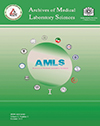Correlation between major depressive disorder and circulating natural killer cells
Archives of Medical Laboratory Sciences,
Vol. 1 No. 2 (2015),
12 October 2015
https://doi.org/10.22037/amls.v1i2.10245
Abstract
Background: Major depressive disorder is a mental disorder characterized by a pervasive and persistent low mood that is accompanied by low self-esteem and loss of interest or pleasure in normally enjoyable activities. Depression is associated with multiple immunological disorders. Aim of the present study was to determine correlation between percentage of circulating NK cells and major depressive disorder.
Materials and Methods: Patients older than 18 years with the desire to participate were enrolled in this study. For depression evaluation, we used the Hamilton Depression Rating Scale and for determination of percentage of NK cells in peripheral blood, flow cytometry method was used.
Results: Our results showed that in patients with major depressive disorder, numbers of circulating NK cells have significantly reduced.
Conclusion: According to our findings, depression is associated with “immune suppression”. NK cells are important in early phase of immunological surveillance versus viral infections and tumors. Indeed, depressive patients are susceptible to cancers and infections.
- major depressive disorder
- natural killer cells
How to Cite
References
Schless A, Mendels J, Kipperman A, Cochrane C. Depression and hostility. The Journal of Nervous and Mental Disease. 1974;159(2):81-100.
Anisman H, Ravindran A, Griffiths J, Merali Z. Endocrine and cytokine correlates of major depression and dysthymia with typical or atypical. Molecular psychiatry. 1999;4:182-8.
Mathers C, Fat DM, Boerma JT. The global burden of disease: 2004 update: World Health Organization; 2008.
Vedhara K, Irwin M. Human psychoneuroimmunology: Oxford University Press; 2005.
Myint AM, Kim YK, Verkerk R, Scharpé S, Steinbusch H, Leonard B. Kynurenine pathway in major depression: evidence of impaired neuroprotection. Journal of affective disorders. 2007;98(1):143-51.
Miller AH. Mechanisms of cytokine-induced behavioral changes: Psychoneuroimmunology at the translational interface. Brain, behavior, and immunity. 2009;23(2):149-58.
Miller AH. Depression and immunity: a role for T cells? Brain, behavior, and immunity. 2010;24(1):1-8.
Vivier E, Tomasello E, Baratin M, Walzer T, Ugolini S. Functions of natural killer cells. Nature immunology. 2008;9(5):503-10.
Sun JC, Lanier LL. Natural killer cells remember: an evolutionary bridge between innate and adaptive immunity? European journal of immunology. 2009;39(8):2059-64.
Lanier LL. NK cell recognition. Annu Rev Immunol. 2005;23:225-74.
Moretta A, Bottino C, Vitale M, Pende D, Cantoni C, Mingari MC, et al. Activating receptors and coreceptors involved in human natural killer cell-mediated cytolysis. Annual review of immunology. 2001;19(1):197-223.
Glaser R, Kiecolt-Glaser JK. Stress-associated immune modulation: relevance to viral infections and chronic fatigue syndrome. The American journal of medicine. 1998;105(3):35S-42S.
Kiecolt-Glaser JK, Glaser R. Depression and immune function: central pathways to morbidity and mortality. Journal of psychosomatic research. 2002;53(4):873-6.
Zorrilla EP, Luborsky L, McKay JR, Rosenthal R, Houldin A, Tax A, et al. The relationship of depression and stressors to immunological assays: a meta-analytic review. Brain, behavior, and immunity. 2001;15(3):199-226.
Evans DL, Nemeroff CB. The clinical use of the dexamethasone suppression test in DSM-III affective disorders: correlation with the severe depressive subtypes of melancholia and psychosis. Journal of psychiatric research. 1987;21(2):185-94.
Nelson JC, Davis JM. DST studies in psychotic depression: a meta-analysis. American Journal of Psychiatry. 2006.
Baniyash M, editor. Chronic inflammation, immunosuppression and cancer: new insights and outlook. Seminars in cancer biology;2006: Academic Press.
Friedman GD. Psychiatrically-diagnosed depression and subsequent cancer. Cancer Epidemiology Biomarkers & Prevention. 1994;3(1):11-3.
Strowig T, Brilot F, Münz C. Noncytotoxic functions of NK cells: direct pathogen restriction and assistance to adaptive immunity. The Journal of Immunology. 2008;180(12):7785-91.
Evans DL, Ten Have TR, Douglas SD, Gettes DR, Morrison M, Chiappini MS, et al. Association of depression with viral load, CD8 T lymphocytes, and natural killer cells in women with HIV infection. American Journal of Psychiatry. 2014.
Cruess DG, Douglas SD, Petitto JM, Ten Have T, Gettes D, Dubé B, et al. Association of resolution of major depression with increased natural killer cell activity among HIV-seropositive women. American Journal of Psychiatry. 2014.
Suarez EC, Krishnan RR, Lewis JG. The relation of severity of depressive symptoms to monocyte-associated proinflammatory cytokines and chemokines in apparently healthy men. Psychosomatic medicine. 2003;65(3):362-8.
Hosseini RF, Azad FJ, Talaee A, Miri S, Mokhber N, Hosseini FF, et al. Assessment of the immune system activity in Iranian patients with Major Depression Disorder (MDD). Iran J Immunol. 2007;4(1):38.
- Abstract Viewed: 457 times
- PDF Downloaded: 468 times
